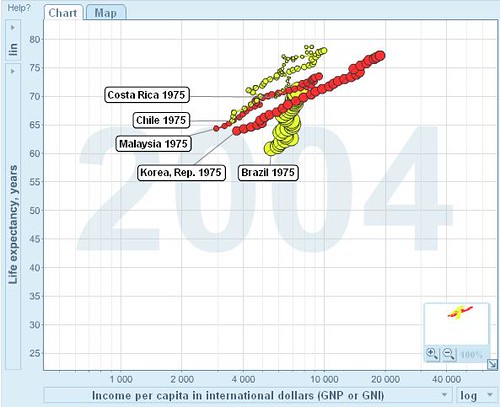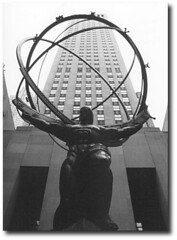
Using Google Gapminder
The graph above shows that in 1975 these countries had the following income per capita / life expectancy:
| Costa Rica | US$5.790 | 70y |
| Brazil | US$5.502 | 61y |
| South Korea | US$3.722 | 64y |
| Chile | US$3.542 | 66y |
| Malaysia | US$2.954 | 64y |
Now moving to 2004, the numbers were:
| South Korea | US$18.840(406%) | 77y(+13y) |
| Chile | US$9.993(182%) | 78y(+12y) |
| Malaysia | US$9.444(219%) | 73y(+9y) |
| Costa Rica | US$8.714(50%) | 79y(+9y) |
| Brazil | US$7.531(36%) | 71y(+10y) |
---x---
Some didn’t like my previous posts about how imports are so expensive in Brazil when compared to the rest of the world. Same old.
I even know what they will say about the data above:
“Ah, but these countries were protectionists too! They had big government programs that helped their industries! Asian countries are financing the US debt! Chile had a dictator! Why do people need an iPod anyway? This is really unfair!”Like every fallacy, this kind of thought has some truth in it. Yes, every single country in the world has some level of protectionism. Yes, some of these countries (Korea and Malaysia especially) had big government programs that subsidized some industries.
SO DID BRAZIL!
Why their programs succeeded and ours failed is an interesting historic discussion. But in my mind, the real important question is why these countries are still growing NOW and we are not.
---x---
The mercantilists thought that the wealth of a country was defined by the amount of gold they held. If you ran a trade deficit, your country was getting poorer. It was that simple.
Capitalism on the other hand, is all about specialization. You import things other countries produce for a cheaper price so you can produce other things and export those at a cheaper price. Not so simple, but it does work.
The only explanation I find to these protectionists policies that still linger in Brazil is that the government still works under the mercantilist paradigm: exports are good, imports are evil.
After all, what industry is Brazil protecting by making an iPod cost so much?
---x---
Back to the iPod index, here is the price for the countries I mentioned above:
| Brazil | US$ 327.71 |
| Costa Rica | US$ 251.00 |
| Chile | US$ 210.92 |
| Malaysia | US$ 199.62 |
| South Korea | US$ 176,17 |
Is it just coincidence?



